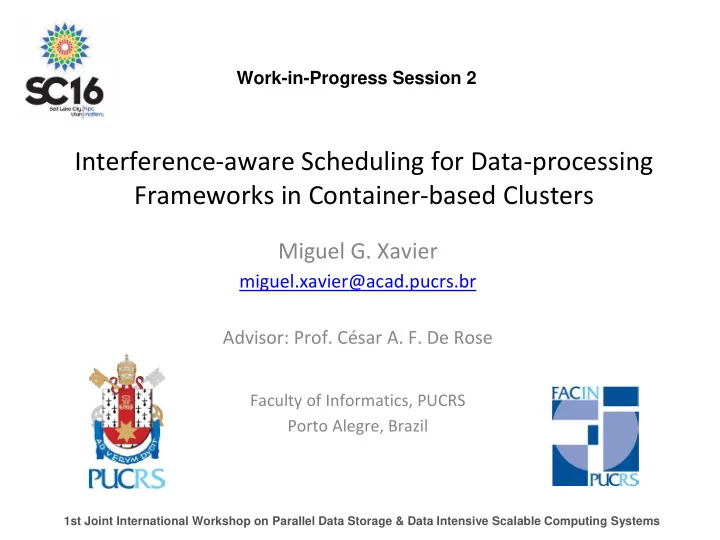

Work-in-Progress Session 2 Interference-aware Scheduling for Data-processing Frameworks in Container-based Clusters Miguel G. Xavier miguel.xavier@acad.pucrs.br Advisor: Prof. César A. F. De Rose Faculty of Informatics, PUCRS Porto Alegre, Brazil 1st Joint International Workshop on Parallel Data Storage & Data Intensive Scalable Computing Systems
Data-processing frameworks As the popularity of large-scale data analysis increases, the emergence of new data- processing frameworks and programming models beyond just MapReduce-centric also grows To process data with different applications in multiple ways: • real-time event processing (Storm); • human-interactive SQL queries (Hive); • batch processing (Java Apps); • graph processing (Giraph); • in-memory processing (Spark); • machine learning (Mahout), and so on. 1st Joint International Workshop on Parallel Data Storage & Data Intensive Scalable Computing Systems
Cluster resource manager Orchestrates multiple frameworks in a cluster of computers and allows applications to access the same data set independent of the framework 1st Joint International Workshop on Parallel Data Storage & Data Intensive Scalable Computing Systems
Cluster resource managers Most popular solutions: • Shares a cluster between multiple different frameworks • Creates another level of resource management • Management is taken away from cluster’s RMS YARN - Hadoop Next Generation • Better job scheduling/monitoring • Uses virtualization to share a • cluster among different frameworks 1st Joint International Workshop on Parallel Data Storage & Data Intensive Scalable Computing Systems
Problem Statement: Interference-related performance degradation in resource- sharing clusters An application might interfere the performance of another co- located application in two ways: • Resource Contention: when multiple applications compete for the same resource (CPU, disk, memory, network); • Resource Isolation Weakness: when multiple co-located applications with allocated resources independently interfere each other. 1st Joint International Workshop on Parallel Data Storage & Data Intensive Scalable Computing Systems
Understanding contention-related performance overheads in resource-sharing clusters Performance variations of co-located data-intensive applications in container-based clusters 1st Joint International Workshop on Parallel Data Storage & Data Intensive Scalable Computing Systems
On-going work We have proposed an interference-aware scheduling for BigData frameworks, aiming at: • Scheduling tasks to clusters in a way that minimizing the performance interference effect from co-located applications • Characterize the performance interference impact and mitigate it whenever possible during the task scheduling/resource provisioning How to get there? 1. profiling queued applications to map resource contention effects 2. clustering applications per their similarity in terms of contention effects 3. scheduling applications' tasks on the best-suited nodes—the nodes that cause the lowest performance interference effects 1st Joint International Workshop on Parallel Data Storage & Data Intensive Scalable Computing Systems
Preliminary clustering analysis Applications are grouped per their similarity prior the scheduling process 1st Joint International Workshop on Parallel Data Storage & Data Intensive Scalable Computing Systems
Next Directions... Interference-aware scheduling design in Yarn 1st Joint International Workshop on Parallel Data Storage & Data Intensive Scalable Computing Systems
Thank you for your attention !! 1st Joint International Workshop on Parallel Data Storage & Data Intensive Scalable Computing Systems
Recommend
More recommend